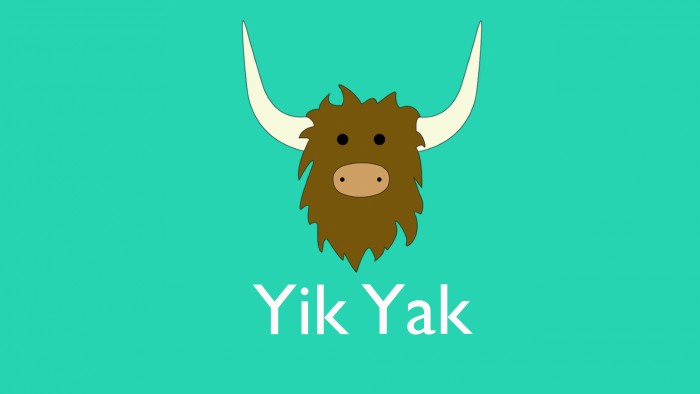ANNIE WEBER | STAFF REPORTER
Yik Yak is an Android and iPhone app targeted at college students that allows the user to send out an anonymous message to others with the app, within a selected geographical radius. Its mission is “to create a feed of what people are saying, thinking and doing around you,” according to its Facebook page.
With this mission also comes some controversy. The word “anonymous,” associated with a form of social media and a screen to hide behind, can translate into rumors being spread in addition to bullying.
In an article in the New York Times, an Eastern Michigan University professor spoke out about the app after a lecture hall of 230 or more students posted dozens of degrading comments about the professor, “I have been defamed, my reputation besmirched. I have been sexually harassed and verbally abused,” she wrote to her union representative.
The professor found out about the comments after a teaching assistant showed her the feed. She then hired a lawyer but was unsuccessful in her lawsuit due to the app being anonymous and the university without means to identify who posted the comments.
Dr. Keith Ablow, psychiatrist, said, “The Yik Yak app is the most dangerous form of social media I’ve ever seen,” in an article for Psychology Today. He explained that Yik Yak “removes all pretense of being a person with empathy, genuinely connected to other human beings.”
Yik Yak has recently affected Butler’s campus as well. Rumors were spread via the app about a Delta Tau Delta hazing video.
On the other hand, Rey Junco, an associate professor of education and human computer interaction at Iowa State University and a faculty associate at the Berkman Center for Internet and Society at Harvard University, argues in his article for WIRED, that Yik Yak is a way for students to unleash their creativity.
“In some of my research on using social technologies in first year classrooms, students who contributed online anonymously brought ideas they shared online into class discussions, showing an openness and willingness to be vulnerable that was previously unseen for incoming students,” Junco said.
Anya Gouloff, sophomore strategic communications major, said that she chose to get a Yik Yak because she had heard some pretty negative things about it and wanted to see what the commotion was about.
“I’m not sure it causes any harm or good, I think it can have the potential to do either of those things but I don’t necessarily think the app was developed to cause anything,” Gouloff said. “ I think it’s just another form of social media.”
Gouloff admits that she sees people get bullied on Yik Yak frequently.
“I’m not even sure the bullies realize their words can hurt someone because it is done in such a way that feels like a joke. There is something so wrong with that though because no one can say how that person feels about being mentioned on Yik Yak, even if they don’t show it or pretend it is funny there is always potential for those words to be hurtful.”

